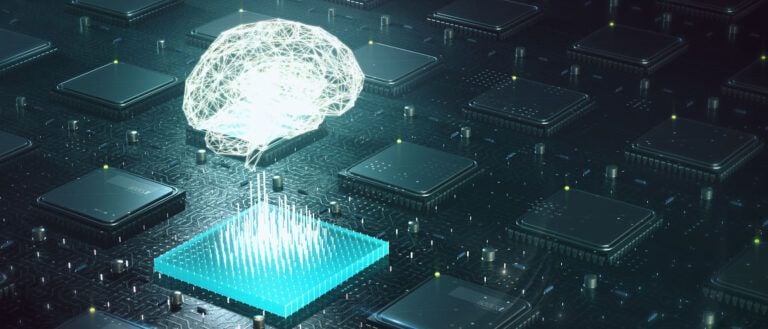Here’s How to Prepare for a Machine Learning Interview: Top Questions

As the world goes through scientific, logistical, and economic upheaval, machine learning (ML) has emerged as a leading technological advancement that has seeped into our daily lives. Machine learning refers to the process of analyzing data using an analytical model that is created by training data. Successful ML depends on the quality of data we feed the model; in this regard, it requires expertise and experience in the field. Owing to the vast number of organizations adopting ML, the demand for skilled professionals is high. Given this, how do you prepare for a machine learning interview in such a competitive market? Let’s find out.
What is the Interview Process for Machine Learning Professionals?
A machine learning interview varies depending on the job role and industry focus. It is usually a mix of technical questions and ones that test the candidate’s organizational fit. Starting with an initial screening, most companies prefer conducting a take-home assignment before the final interview.
How to Prepare for a Machine Learning Interview?
The key to cracking any interview is to tackle tricky questions without losing composure. To prepare for a machine learning interview, therefore, one must be updated on the latest developments in the field, review their experience and related projects thoroughly, and scrutinize their motivations for establishing a career in ML. Last but not the least, it would serve you well to familiarize yourself with some of the most frequently asked questions in a machine learning interview.
Common Questions in a Machine Learning Interview
1. What are the Different Types of Learning/Training Models in ML?
The three main types of learning models in machine learning are supervised learning, unsupervised learning, and reinforcement learning. All three types are further divided into subtypes. Other common learning models are clustering, classification models, regression models, deep learning, and dimensionality reduction.
2. There are Currently Many Machine Learning Algorithms. How Can One Determine Which Algorithm Should be Used for Problems?
There are certain steps and factors to consider while selecting the right algorithm for your ML problem. These include data structure and complexity, accuracy requirements, processing speed, variables or unique features of the problem and training model, and parameters like the number of iterations needed.
3. Tell Me the Difference Between Artificial Intelligence (AI), Machine Learning (ML), and Deep Learning.
Although closely interlinked, there are significant differences between AI, ML, and deep learning. Artificial intelligence is the process that allows machines to mimic human behavior using algorithms; it is an umbrella term that encompasses both machine learning and deep learning. Machine learning, on the other hand, uses statistical methods to improve machines with experience, allowing them to ‘learn’ from data. Lastly, deep learning is a subset of ML and refers to the study of neural networks to imitate the functioning of the human brain.
ALSO READ: How to Become a Machine Learning Engineer and Have a Lucrative Career
4. Tell Me the Difference Between Deep Learning and Machine Learning.
In addition to the differences mentioned above, ML and deep learning vary on other accounts as well. The objective of ML is to sharpen accuracy without much consideration for the success ratio. In contrast, deep learning is capable of achieving the highest degree of accuracy when trained with a sufficient volume of data. Also, ML is less efficient than deep learning so it’s not suitable for large amounts of data or longer dimensions. However, the efficiency of deep learning can be seen in its application in caption generation, image analysis, sentiment-based news aggregation, etc. Applications of ML include malware filtering, virtual assistants, and spam filtering.
5. Explain One-Hot Encoding and Label Encoding. How do They Affect the Dimensionality of the Given Data Set?
One-hot coding involves creating new variables with values of 0 and 1 to represent original categorical values. This increases the dimensionality of the data set. Label encoding, on the other hand, assigns each categorical value an integer value in alphabetical order. This has no effect on the dimensionality of the data set.
6. How Could You Apply Machine Learning to Hardware?
Although primarily used in software applications, ML can be integral to enhancing hardware security, especially with Hardware Trojan and counterfeit integrated circuits.
7. Tell Me the Difference Between Causality and Correlation.
Causality is where one action leads to another: action A leads to outcome B. Correlation, however, simply entails a relationship between two entities where action A relates to outcome B.
ALSO READ: 4 Types of Machine Learning for a Great Career in Tech and How to Build a Great Career in Each
8. How are Covariance and Correlation Different From Each Other?
Covariance and correlation are both used in regression analysis and statistics but differ in use. While correlation describes how two variables are related, covariance explains where and how two variables differ from each other.
Tips for Preparing for Your Machine Learning Interview
Now that you have a clear understanding of how to prepare for a machine learning interview, here are a few final tips that will help you ace one.

- Apply theoretical concepts and focus on the relevance of the knowledge in real time
- Research the company’s focus and try to tailor your responses accordingly
- Be clear and concise with your answers; hesitating or stuttering gives a negative impression to the interviewer
- It’s also useful to be familiar with the interviewer’s area of expertise
- In an interview, attitude is everything: be poised, confident, and open to learning
Machine learning is a dynamic, fast-growing, and lucrative field. Employment in the computer and IT sector is set to grow 15% between 2021 and 2031, which means more growth opportunities along with heightened competition. So equip yourself with the necessary knowledge with Emeritus’ courses on offer and get going!
Write to us at content@emeritus.org





